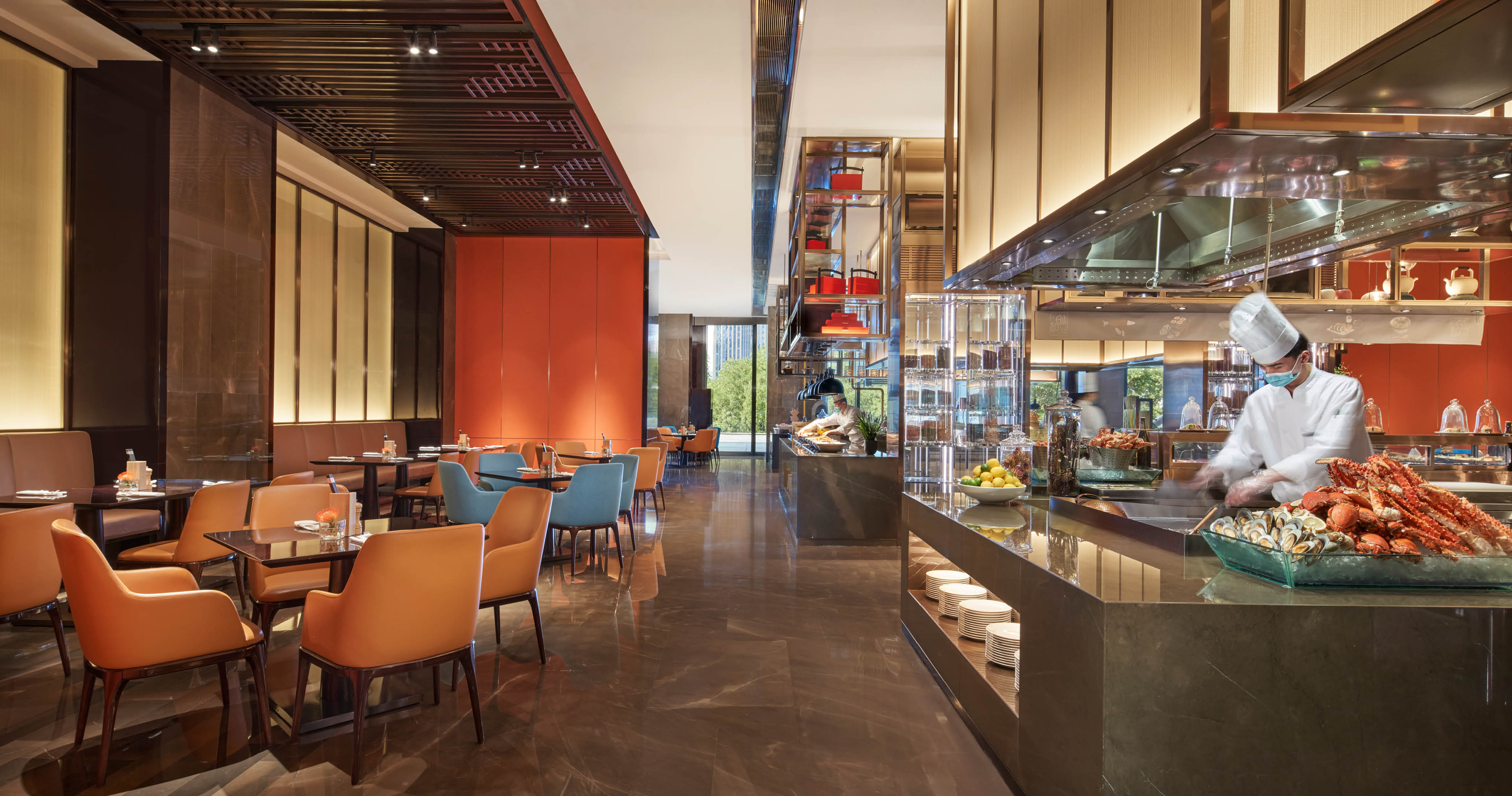
For a foodservice consultant, breaking into Lanzhou – the capital of China’s northwestern Gansu province – wasn’t easy, explains the Hong Kong-based managing director of Orange Design, Jimmy Wong FCSI. However, after spending a number of years building a presence in the area, in 2017 Wong and his team took over a project to consult on the food and beverage operations for the freshly rebranded Hyatt Regency Lanzhou.
First entering Lanzhou over a decade ago in 2008, Wong explains that back then there was, “little understanding of foodservice consultants; most hotel developers opted for kitchen equipment factories who would design spaces for free.” However, as these suppliers often prioritised their own equipment sales over what necessarily worked best for the catering teams, as well as operators’ long-term vision, cracks began to show.
After years of roadshows and government-organised technical exchanges in the area, Wong continues, hotels gradually came to understand the value of impartial consultants and Orange Design was tasked by Hyatt Regency Lanzhou’s owner Cheng Yao to take over the project with a more holistic outlook. The brief included consulting on the design and concepts of 24-hour global eatery Market Café, regional Chinese restaurant Xiang Yue (showcasing Gansu, Guangdong and Hangzhou cuisines), and a soon-to-open luxury hotpot venue.
Creating a tourist destination
Originally opening as the Barazza Fairyland Hotel in November 2019, and now managed by the Hyatt Hotels Corporation, Hyatt Regency Lanzhou is located in the heart of the city and set on the bank of the Yellow River.
Drawing on Wong’s years of expertise, Hyatt Regency Lanzhou’s marketing and communications manager Luna Lu explains that the Orange team were brought in to meet “the hotel owner’s extremely high catering standards” and build an only-in-Lanzhou dining experience, ensuring that the hotel could offer a premium travel experience on par to that of China’s first-tier cities.
A highly collaborative venture from start to finish, with these goals in mind, “we had in-depth discussions with the hotel catering team at the beginning of the project,” says Wong. For the F&B team, an important part of the food programming was to put the spotlight on local cuisine.
Thanks to its rich history and its key position on the ancient Silk Road, Lanzhou is home to a mix of ethnicities and cultures, including Islamic influences, as well as being a tourist hub with travellers accounting for over 50% of the target market (75% from other Chinese cities).
Balancing factors including halal dietary requirements and regional palates, Orange recommended integrating different types of cuisine from across the country into the menus “in order to ensure the future rate of return on catering.”
After almost six months of discussions, the teams developed what Wong calls a “fusion speciality” programme. Showcasing signature dishes from the region alongside broad flavours to suit a wider range of palates. “The programme combines, 25% local specialities, 45% Chinese specialities and 30% dishes from all over the world, so tourists can quickly immerse themselves in a sea of delicious food.”
And the time investment paid off. “After opening, the hotel’s foodservice operations exceeded expectations, especially the buffet, which has become a hot ticket that has to be booked a week in advance.”
Thinking green
An essential factor in all of Orange Design’s projects is sustainability at every step. Hyatt Regency Lanzhou was no exception. Strongly aligned with what Lu describes as Yao’s requirements of “high energy conservation and durability”, Wong emphasises that “the technical team’s designs are made to maximise energy saving and reduce carbon emissions” – with each piece of kitchen equipment installed playing a vital role.
For example, the team installed a central Bohn cold storage unit, “which can effectively save energy through frequency conversion technology. In addition, the hot water produced by the heat recovery system supplies the entire kitchen system.” Putting the savings into numbers, Wong explains: “The cold storage system alone can reduce about 20,736kg of Co2 emissions annually.” Furthermore, the refrigeration appliances are all latest models from Williams, “a brand that represents excellent performance, high efficiency and durability, [while also meeting] HACCP standards.”
As China increasingly takes drastic nationwide steps to manage and reduce its municipal solid waste, another important area of focus was the all the venues’ waste treatment systems. Kitting out the kitchens with InSinkErators, Wong adds: “Investment in this waste disposal system can cut 1,512 tonnes of kitchen waste discharge every year.” Instead waste is converted into organic fertiliser.
Overcoming design challenges
By the time Orange came to the project, the structural, electrical and mechanical designs for the hotel had already been determined. Located on the second, third and fourth floors of the hotel respectively, Market Café, Xiang Yue and the hotpot restaurant required special design features.
“The F&B outlets have high requirements for exhaust fumes, because low-altitude emissions are required,” Wong explains. Due to the restaurants’ position in the hotel, “the exhaust outlet faces residential areas, so if not managed correctly the fumes would affect the residents’ living environment.”
Orange’s technical team spent a month researching and formulating an extensive exhaust air treatment plan and customising an control system for the oil fume exhaust. They adopted a “UV-C photolysis treatment to effectively deodorise the fumes [paired with] electrostatic dust collection to collect the fine particles.” As a result, “The exhaust gas has no impact on the residents and the surrounding air is improved,” Wong says.
Despite what he calls a “relatively late” intervention to the Hyatt Regency Lanzhou project, a combination of the Orange team’s seasoned experience, as well as continued support from Yao and the Hyatt F&B team, resulted in a successful operation for all parties. Not only did Orange Design’s involvement see “the investment budget used rationally to achieve the desired vision, [the team even] exceeded the foodservice brief,” says Lu.
As for Wong? He’s proud of Orange’s achievements, concluding: “Hyatt Regency Lanzhou’s foodservice operations have become representative of the city. This is an endorsement of our team and I’m very happy.”
Amy Snelling
